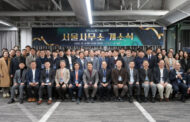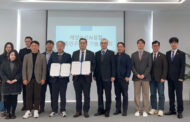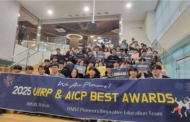“Science and engineering education seems stuck in the 1950s. Bold changes are needed to keep up with the rapidly changing pace of technological innovations.”
The past two years for UNIST President Yong Hoon Lee have been a process of re-establishing the framework of science and technology education in Korea. He emphasized that introducing the ‘Combat-type’ education system is the role of S&T-centric research universities that prepare for the future of national science and technology.
Combat-type education refers to an educational method where you learn the fundamental rules and basic moves, then engage in actual battle and experience it yourself or learn it directly. Such method contrasts with the ‘Kung Fu‘ style education system where one takes a step-by-step approach to acquire knowledge thoroughly in all fields of study. This will also enhance students’ problem-solving capabilities.

President Yong Hoon Lee held a press conference on the occasion of the second anniversary of his inauguration in Seoul to discuss the past achievements and the future goals of UNIST. | Image Credit: Seokmin Kim
“Science and technology are key to solving global challenges, such as pandemics and climate change,” says President Lee. “This is another reason why the supply of S&T talents who are capable of solving the problems that society faces today, is most needed.”
President Yong Hoon Lee has been working tirelessly to foster innovation in science and engineering education since he began his term as the fourth president of UNIST in November 2019. At its core were two things: Providing quick access to the recent research trends, and offering hands-on experience. Through this, President Lee aimed to foster “BTS in science and technology.”
President Lee has provided expanded educational options for all students by designing short-term intensive courses for the AI and digital era. The ‘One Day Lecture Series,’ which started during the second semester of 2021, offers courses that students are highly interested in, such as blockchain and cancer treatment.
There is also an opportunity for hands-on experience to enhance students’ research skills and help them practice and deepen their understanding of new knowledge. A total of 23 teams and 97 students are currently participating in the ‘AI Challengers Program (AICP),’ which took place throughout the year 2021. Throughout the program, students either engage with global challenges or write a research paper in the field of AI. For the ‘BTS (Brain to Society) Team’ project, about 170 students participated to solve industrial problems, encountered by 26 local companies in Ulsan.

Students, participating in the AI Challengers Program (AICP). l Image Credit: UNIST 사진: UNIST Magazine Autumn 2021
The co-operative (Co-Op) education program is also offered for third and fourth-year students to gain hands-on work experiences in complex real-world contexts. The program consists of 2 months of pre-training, in addition to 6 months of hands-on work. This year, 18 students have been dispatched to eight companies, including Naver Corp. and LG Electronics Inc. In addition to this, about 30 students participate annually in the Company-University Cooperation (CUop) program where students work for two months at small and medium-sized enterprises and startups.
There is also plenty of learning opportunities for students who wish to start their own businesses. UNIST provides systematic education for potential entrepreneurs via Unicorn Project and offers research-based technology start-up support programs via I-Corps.
The local community is also actively responding to UNIST’s efforts in cultivating high-tech talents and future entrepreneurs. UNIST has recently received a KRW 30 billion endowment from Duksan Group Chairman Junho Lee. Chairman Lee requested UNIST to use this endowment fund towards establishing a new innovation model to revive the local economy by fostering local talents and revitalizing youth start-ups in Ulsan. UNIST also plans to establish UNIST Challenge Convergence Building (tentative name) with this donation. This will become a space where future talents who will grow into ‘BTS in Science and Technology’ can receive innovative education in all fields of science and technology and start their own businesses freely.


![[2nd Anniversary of President Yong Hoon Lee’s Inauguration] Ch 1. Educational Innovation](https://news.unist.ac.kr/wp-content/uploads/2021/12/President-Lee-main-800x426.jpeg)












